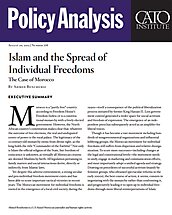Morocco is a “partly free” country according to Freedom House’s Freedom Index—it is a constitutional monarchy with a freely elected government. However, the North African country’s constitution makes clear that, whatever the outcome of free elections, the real and undisputed center of power is the royal palace. The legitimacy of the 12-century-old monarchy stems from divine right, as the king holds the title “Commander of the Faithful.” Not only is Islam the official religion of the State, but freedom of conscience is unknown, as virtually all Moroccan citizens are deemed Muslims by birth. All legislation pertaining to family matters and social interactions derive, directly or indirectly, from Islamic laws.
Yet despite this adverse environment, a strong secular and pro-individual freedom movement exists and has been able to score important tactical victories in recent years. The Moroccan movement for individual freedoms is rooted in the emergence of a local civil society during the 1990s—itself a consequence of the political liberalization process initiated by former King Hassan II. Less government control generated a wider space for social activism and freedom of expression. The emergence of an independent press has subsequently acted as an amplifier for liberal voices.
Though it has become a vast movement including hundreds of nongovernmental organizations and influential lobbying groups, the Moroccan movement for individual freedoms still suffers from dispersion and relative disorganization. To score more successes—including changes at the legal and constitutional levels—the movement needs to unify, engage in marketing and communication efforts, and most importantly adopt a unified agenda and strategy. Drawing on precedents of successful activism (mainly by feminist groups, who obtained spectacular reforms in the early 2000s), the best course of action, it seems, consists in negotiating with the monarchy rather than confronting it, and progressively leading it to open up to individual freedoms through more liberal reinterpretations of Islam.
